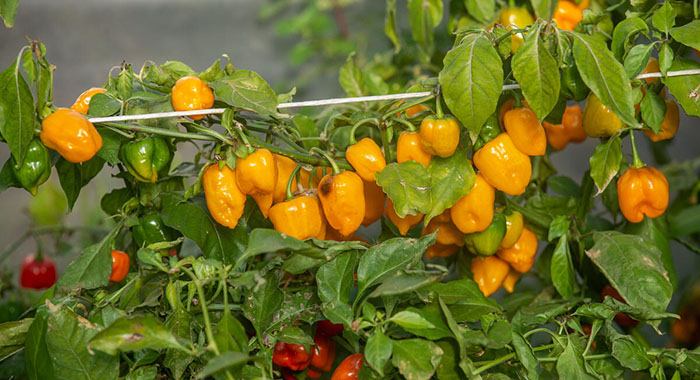Building on the country’s plans to increase food production and trade, public and private sector stakeholders from St. Vincent and the Grenadines (SVG) have identified two important crops for further development over the coming years.
Dasheen, a prime crop in the country, was first selected by the Ministry of Agriculture as a suitable commodity for development through a two-year project of the Food and Agriculture Organization of the United Nations’ Technical Cooperation Programme.
The project on Promoting Windward Islands Food Production and Trade Corridor through National and Regional Value Chain Development, launched in 2023, calls for the selection of an additional commodity with the greatest potential for balancing demand with supply over the life of the project.
During a recent value chain selection workshop, held virtually, stakeholders from the public and private sectors selected hot pepper as the second commodity from a list of six crops with strong potential and readiness for scaling up.
Facilitated by FAO Trade Development Consultant, Jai Rampersad, the stakeholders reviewed sweet potato, plantain, hot pepper, coconut, mango, and breadfruit. Hot pepper was selected as the crop with the greatest potential to be developed for the export market.
The stakeholders agreed on the need to identify hot pepper varieties to be developed and to correct some of the gaps in the market that would need to be filled to ensure the success of the commodity. Ensuring the consistency of production of the selected variety was also seen as crucial to the success of the selected value chain.
During the workshop, special interventions from the private sector and civil society were made by representatives from the Eastern Caribbean Trading Agriculture and Development Organisation (ECTAD), the Caribbean Farmers Network (CaFAN), regional exporters Vincy Fresh, and international exporters, Pure Caribbean Distributors and Seasons Farm Fresh, Inc. From the public sector were representatives from various agencies of the Ministry of Agriculture, who also shared their views on the performance of each commodity in the country and the opportunities for increased production and export.
Juan Cheaz Pelaez, FAO trade and markets officer for the Caribbean and lead technical officer for the project said the country’s selection of hot peppers “indicates a readiness to strengthen this second value chain in the context of the project.
“Through capacity building, a national team is now able to play a more active role in applying a market-driven approach to value chain development, enhancing competitiveness and resilience in the agricultural sector. We are not only focusing on production, but on strengthening institutional capacity of the government and improving coordination between the public and private sectors to ensure a sustainable and robust hot pepper value chain.”
Over the next year, Rampersad and the FAO Caribbean Value Chains team will support the stakeholders in analysing the performance of the hot pepper sector, analysing the cost of production, and identifying opportunities and constraints and how best to address them. These analyses will lead to the development of an upgrading strategy, and the design of pilot programmes to start implementing specific priority enhancements, with the participation and support of public and private sector stakeholders. The strategy serves as a roadmap for collective engagement of value chain actors to continue implementation after the project.







Lol. SVG had a hot pepper indistry that was the most well organised and profitable in the region. What happened it to it? Mash it up and now looking it build it back.? Stewps!
Pepper will replace Bananas right? We are hearng the cry of farmers who say price obtained cannot pay for the cost of production. Now we are hearing the cry to grow peppers.Saboto,” Fool me one shame on you, Fool me twice shame on me”.
The call was dasheen, not we are hearing that the production of dasheen cannot pay for ghe cost of productions. Farmers are better of leaving the produce in the fiels rather that to harvest them for the markets. Now the call is for pepper and more peppers? Why is this so? The reason is all political and the answers are found in bosom of Ulp politics.
The Comrade assigned one of the most problematic ministry to Minister Saboto while the most important Minister is given to the younger son or “baby Doc”. He has gradually been nurtured to take over the leadership having having been groomed for the job. Minister baby doc Duvalier has now the requisite qualification to succeed Papa Doc” By far he is mostly qualified and suitable for the job.
Who were the spoke person at the recent ly held Celsc meeting? First sure it was Baby Doc. The Minister of Agriculture was absent or invisible. Was this a mere coincidence? Wake up Soboto. It was a well orchestrated move to assign you into the annals of oblivion.There is no resurrection for you You have become redundant by the process of natural selection.